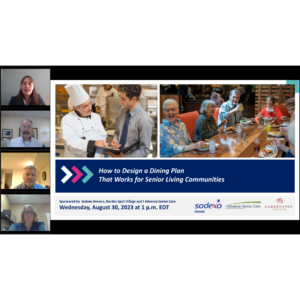Hospitality and leadership in the dining room
Picture a leader. What image comes to mind? Did you picture a caregiver for whom English is a second language? A 17-year-old server, wearing an apron and balancing three plates of spaghetti on one arm? Or perhaps a housekeeper who is hosting in the dining room to pick up additional hours? I hope so.
These employees are emerging leaders within senior care communities. For elderly residents, these are the people directing mealtimes in their home environment—a home environment made up of a diverse and often complex group of individuals (once strangers) who choose to live in community and enjoy services not provided elsewhere. Most grow to appreciate their neighbors and bond through their common needs. Most become attached to staff members, whom they see more often than family.
A server walking into this dining setting may see cultural, generational or socioeconomic differences between themselves and the residents. They may not realize that the residents see similar differences among themselves.
In today’s senior care dining environment, a server’s role is evolving to ensure residents’ sense of belonging and community within the dining room. Learning to blend service and hospitality is the only way to achieve the right balance, to set the ambience of home.
Forward-thinking providers and administrators see the wisdom and value of arming their staff with a new skill set: hospitality. The importance of dining in residents’ quality of life has been proven. However, the concept is just beginning to sink in and be embraced by nursing homes, as the Centers for Medicare & Medicaid Services (CMS) is changing the survey process. This approach will revolutionize dining in the senior housing marketplace and have far-reaching effects on all senior care communities.
IMPROVING THE BOTTOM LINE
Enhancing residents’ quality of life by improving the dining experience translates ultimately to the bottom line for business owners and administrators: Successful senior care communities nationwide consistently show that a strong sense of community creates more profitability. Additionally, through the interview process of CMS’s Quality Indicator Survey (QIS), residents are being observed closely—and heard loud and clear. The dining room (and in-room dining) is a focal point for surveyors to observe residents’ health and appearance, quality of interactions and accommodation of dietary preferences. The role of servers in long-term care has never been so visible.
The serving role may be all or part of a person’s job in a community, but it has not typically been seen as a valuable role. Exacerbating this lack of value is the common complaint that server duties are often not clear in job descriptions. Language barriers and cultural barriers may further add to the confusion about expectations around meal service.
Staff looks to administrators for leadership. Those administrators who value the dining experience model the way. They educate staff on company values and standards. They are visible in dining areas, they get involved in the serving process and they communicate clearly about service expectations with the understanding that people are not born knowing how to provide good service. These expectations must go beyond the logistics of serving, although those details are important.
BREAKING DOWN BARRIERS
Administrators’ show of value and respect for servers results in residents being treated with more dignity and respect. Education about service should empower servers to create community, a sense of “we’re all in this together.” This education begins with a different kind of staff training, focused on breaking down perceived barriers between people of different backgrounds, cultivating relationship skills and building self-esteem by giving each staff member a voice. When staff see their own value and are able to care for each other, they are better able to respond to resident needs.
Imagine a senior care community where residents are highly satisfied with meals—both the food and the dining experience. On a typical day, many residents spend as much as 60 percent of their time preparing for, engaging in or returning from meals. Extended family and local community members choose to dine at the onsite dining room rather than visiting residents elsewhere. Staff welcome residents by name, introduce residents to each other and cater to their individual dining preferences. The administrator is seen hosting in the dining room on a regular basis. This is a picture of Villa Crest Nursing and Retirement Center in Manchester, N.H. (and winner of Long-Term Living’s 2011 OPTIMA Award.)
Villa Crest won the 2011 OPTIMA Award for its innovative, outcome-oriented staff teamwork. It is an example of what an administrator with forward-thinking vision can accomplish. In April 2010, Administrator Sarah McEvoy and her staff (“partners”) moved from a traditional dining approach with limited options and a rigid daily schedule to a restaurant-style meal experience they called CHOICES. Villa Crest improved its menu and service by offering freshly made fare and added flexibility to the dining room’s hours of operation. They also implemented principles of hospitality through specialized training.
I traveled to Villa Crest to conduct a three-day training workshop for a committed core group of 14 partners. We discussed the importance of hospitality and how much it can affect the experience of sitting down to a meal. Partners had the opportunity to reflect on their preconceptions about the elderly, to bond with each other and to gain a compassionate understanding of resident needs. Two partners became certified trainers who spearhead Villa Crest’s ongoing service improvement program, and CHOICES has been a big hit since it began in April of 2010.
In his book, You Don't Need a Title to Be a Leader, leadership speaker Mark Sanborn writes, “When you do your job—any job—with initiative and determination to make a positive difference, you become a leader.”1 This is what I work to inspire in each person: to believe in themselves, to know that they make a difference just by showing up. When serving staff understand how important they are to the residents, most choose to make it positive and learn new skills.
Cindy Heilman heads Higher Standards, LLC, an Oregon-based training and consulting company. She created the Kind Dining® training curriculum.
REFERENCE
- Sanborn M. You Don't Need a Title to Be a Leader: How Anyone, Anywhere, Can Make a Positive Difference. New York: Crown Business, 2006.
I Advance Senior Care is the industry-leading source for practical, in-depth, business-building, and resident care information for owners, executives, administrators, and directors of nursing at assisted living communities, skilled nursing facilities, post-acute facilities, and continuing care retirement communities. The I Advance Senior Care editorial team and industry experts provide market analysis, strategic direction, policy commentary, clinical best-practices, business management, and technology breakthroughs.
I Advance Senior Care is part of the Institute for the Advancement of Senior Care and published by Plain-English Health Care.
Related Articles
Topics: Articles , Nutrition , Staffing











